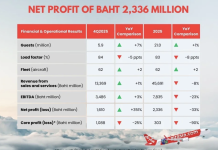KUALA LUMPUR, 1 October 2025: Preliminary August 2025 traffic figures released Tuesday by the Association of Asia Pacific Airlines (AAPA) show continued growth in international passenger demand, on the back of strong business and leisure travel activity across the region and globally.
In August, Asia-Pacific airlines carried 34.3 million international passengers, an 8.8% increase compared to the same month last year. Traffic, as measured in revenue passenger kilometres (RPK), grew by 9.1% year-on-year, underpinned by strength in longer-haul markets. The average international passenger load factor remained elevated at 82.9%, with the 9.2% expansion in available seat capacity closely matching demand growth.

International air cargo markets also continued to expand in August, spurred by stockpiling activity as businesses sought to mitigate tariff-related price pressures. Alongside the sustained demand for e-commerce shipments, international air cargo demand, measured in freight tonne-kilometres (FTK), increased by 5.4% year-over-year. Offered freight capacity grew by 5.5% year-on-year, resulting in a marginal 0.1 percentage point decline in the average international freight load factor to 59.5%.
Commenting on the results, AAPA Director General Subhas Menon said: “Both passenger and cargo markets have continued to demonstrate resilience in the face of global challenges, including protectionist trade measures and ongoing supply chain constraints. During the first eight months of the year, Asia Pacific airlines carried 258 million international passengers, a 10.8% increase compared to the same period last year, while international air cargo demand grew by 6.4%. Shifts in trade flows, driven by higher tariffs, also lent support to cargo traffic growth from the region’s major manufacturing hubs.”
Looking ahead, Menon commented, “The region’s carriers remain cautiously optimistic, with travel demand expected to stay resilient, underpinned by continued expansion in global economic activity, particularly in Asia. On the cargo front, the near-term outlook is likely to be shaped by further developments in global trade policy and inventory cycles.”
“Persistent supply chain constraints and associated pressures on operating costs will continue to pose challenges, underscoring the need for airlines to remain agile in responding to market demand, and for continued vigilance in cost management. Overall, Asia Pacific airlines are well-positioned to navigate the wider economic and operational challenges that present themselves in the coming months.”







